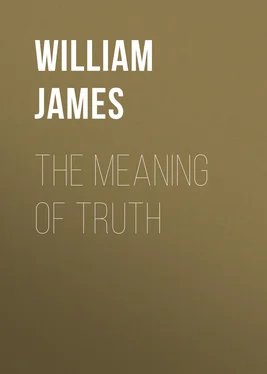William James - The Meaning of Truth
Здесь есть возможность читать онлайн «William James - The Meaning of Truth» — ознакомительный отрывок электронной книги совершенно бесплатно, а после прочтения отрывка купить полную версию. В некоторых случаях можно слушать аудио, скачать через торрент в формате fb2 и присутствует краткое содержание. Жанр: foreign_antique, Философия, foreign_edu, на английском языке. Описание произведения, (предисловие) а так же отзывы посетителей доступны на портале библиотеки ЛибКат.
- Название:The Meaning of Truth
- Автор:
- Жанр:
- Год:неизвестен
- ISBN:нет данных
- Рейтинг книги:3 / 5. Голосов: 1
-
Избранное:Добавить в избранное
- Отзывы:
-
Ваша оценка:
- 60
- 1
- 2
- 3
- 4
- 5
The Meaning of Truth: краткое содержание, описание и аннотация
Предлагаем к чтению аннотацию, описание, краткое содержание или предисловие (зависит от того, что написал сам автор книги «The Meaning of Truth»). Если вы не нашли необходимую информацию о книге — напишите в комментариях, мы постараемся отыскать её.
The Meaning of Truth — читать онлайн ознакомительный отрывок
Ниже представлен текст книги, разбитый по страницам. Система сохранения места последней прочитанной страницы, позволяет с удобством читать онлайн бесплатно книгу «The Meaning of Truth», без необходимости каждый раз заново искать на чём Вы остановились. Поставьте закладку, и сможете в любой момент перейти на страницу, на которой закончили чтение.
Интервал:
Закладка:
In the whole field of symbolic thought we are universally held both to intend, to speak of, and to reach conclusions about—to know in short—particular realities, without having in our subjective consciousness any mind-stuff that resembles them even in a remote degree. We are instructed about them by language which awakens no consciousness beyond its sound; and we know WHICH realities they are by the faintest and most fragmentary glimpse of some remote context they may have and by no direct imagination of themselves. As minds may differ here, let me speak in the first person. I am sure that my own current thinking has WORDS for its almost exclusive subjective material, words which are made intelligible by being referred to some reality that lies beyond the horizon of direct consciousness, and of which I am only aware as of a terminal MORE existing in a certain direction, to which the words might lead but do not lead yet. The SUBJECT, or TOPIC, of the words is usually something towards which I mentally seem to pitch them in a backward way, almost as I might jerk my thumb over my shoulder to point at something, without looking round, if I were only entirely sure that it was there. The UPSHOT, or CONCLUSION, of the words is something towards which I seem to incline my head forwards, as if giving assent to its existence, tho all my mind's eye catches sight of may be some tatter of an image connected with it, which tatter, however, if only endued with the feeling of familiarity and reality, makes me feel that the whole to which it belongs is rational and real, and fit to be let pass.
Here then is cognitive consciousness on a large scale, and yet what it knows, it hardly resembles in the least degree. The formula last laid down for our thesis must therefore be made more complete. We may now express it thus: A PERCEPT KNOWS WHATEVER REALITY IT DIRECTLY OR INDIRECTLY OPERATES ON AND RESEMBLES; ACONCEPTUAL FEELING, OR THOUGHT KNOWS A REALITY, WHENEVER IT ACTUALLY OR POTENTIALLY TERMINATES IN A PERCEPT THAT OPERATES ON, OR RESEMBLES THAT REALITY, OR IS OTHERWISE CONNECTED WITH IT OR WITH ITS CONTEXT. The latter percept may be either sensation or sensorial idea; and when I say the thought must TERMINATE in such a percept, I mean that it must ultimately be capable of leading up thereto,—by the way of practical [missing section] is an incomplete 'thought about' that reality, that reality is its 'topic,' etc. experience, if the terminal feeling be a sensation; by the way of logical or habitual suggestion, if it be only an image in the mind.
Let an illustration make this plainer. I open the first book I take up, and read the first sentence that meets my eye: 'Newton saw the handiwork of God in the heavens as plainly as Paley in the animal kingdom.' I immediately look back and try to analyze the subjective state in which I rapidly apprehended this sentence as I read it. In the first place there was an obvious feeling that the sentence was intelligible and rational and related to the world of realities. There was also a sense of agreement or harmony between 'Newton,' 'Paley,' and 'God.' There was no apparent image connected with the words 'heavens,' or 'handiwork,' or 'God'; they were words merely. With 'animal kingdom' I think there was the faintest consciousness (it may possibly have been an image of the steps) of the Museum of Zoology in the town of Cambridge where I write. With 'Paley' there was an equally faint consciousness of a small dark leather book; and with 'Newton' a pretty distinct vision of the right-hand lower corner of curling periwig. This is all the mind-stuff I can discover in my first consciousness of the meaning of this sentence, and I am afraid that even not all of this would have been present had I come upon the sentence in a genuine reading of the book, and not picked it out for an experiment. And yet my consciousness was truly cognitive. The sentence is 'about realities' which my psychological critic—for we must not forget him—acknowledges to be such, even as he acknowledges my distinct feeling that they ARE realities, and my acquiescence in the general rightness of what I read of them, to be true knowledge on my part.
Now what justifies my critic in being as lenient as this? This singularly inadequate consciousness of mine, made up of symbols that neither resemble nor affect the realities they stand for,—how can he be sure it is cognizant of the very realities he has himself in mind?
He is sure because in countless like cases he has seen such inadequate and symbolic thoughts, by developing themselves, terminate in percepts that practically modified and presumably resembled his own. By 'developing' themselves is meant obeying their tendencies, following up the suggestions nascently present in them, working in the direction in which they seem to point, clearing up the penumbra, making distinct the halo, unravelling the fringe, which is part of their composition, and in the midst of which their more substantive kernel of subjective content seems consciously to lie. Thus I may develop my thought in the Paley direction by procuring the brown leather volume and bringing the passages about the animal kingdom before the critic's eyes. I may satisfy him that the words mean for me just what they mean for him, by showing him IN CONCRETO the very animals and their arrangements, of which the pages treat. I may get Newton's works and portraits; or if I follow the line of suggestion of the wig, I may smother my critic in seventeenth-century matters pertaining to Newton's environment, to show that the word 'Newton' has the same LOCUS and relations in both our minds. Finally I may, by act and word, persuade him that what I mean by God and the heavens and the analogy of the handiworks, is just what he means also.
My demonstration in the last resort is to his SENSES. My thought makes me act on his senses much as he might himself act on them, were he pursuing the consequences of a perception of his own. Practically then MY thought terminates in HIS realities. He willingly supposes it, therefore, to be OF them, and inwardly to RESEMBLE what his own thought would be, were it of the same symbolic sort as mine. And the pivot and fulcrum and support of his mental persuasion, is the sensible operation which my thought leads me, or may lead, to effect—the bringing of Paley's book, of Newton's portrait, etc., before his very eyes.
In the last analysis, then, we believe that we all know and think about and talk about the same world, because WE BELIEVE OUR PERCEPTS ARE POSSESSED BY US IN COMMON. And we believe this because the percepts of each one of us seem to be changed in consequence of changes in the percepts of someone else. What I am for you is in the first instance a percept of your own. Unexpectedly, however, I open and show you a book, uttering certain sounds the while. These acts are also your percepts, but they so resemble acts of yours with feelings prompting them, that you cannot doubt I have the feelings too, or that the book is one book felt in both our worlds. That it is felt in the same way, that my feelings of it resemble yours, is something of which we never can be sure, but which we assume as the simplest hypothesis that meets the case. As a matter of fact, we never ARE sure of it, and, as ERKENNTNISSTHEORETIKER, we can only say that of feelings that should NOT resemble each other, both could not know the same thing at the same time in the same way. [Footnote: Though both might terminate in the same thing and be incomplete thoughts 'about' it.] If each holds to its own percept as the reality, it is bound to say of the other percept, that, though it may INTEND that reality, and prove this by working change upon it, yet, if it do not resemble it, it is all false and wrong. [Footnote: The difference between Idealism and Realism is immaterial here. What is said in the text is consistent with either theory. A law by which my percept shall change yours directly is no more mysterious than a law by which it shall first change a physical reality, and then the reality change yours. In either case you and I seem knit into a continuous world, and not to form a pair of solipsisms.]
Читать дальшеИнтервал:
Закладка:
Похожие книги на «The Meaning of Truth»
Представляем Вашему вниманию похожие книги на «The Meaning of Truth» списком для выбора. Мы отобрали схожую по названию и смыслу литературу в надежде предоставить читателям больше вариантов отыскать новые, интересные, ещё непрочитанные произведения.
Обсуждение, отзывы о книге «The Meaning of Truth» и просто собственные мнения читателей. Оставьте ваши комментарии, напишите, что Вы думаете о произведении, его смысле или главных героях. Укажите что конкретно понравилось, а что нет, и почему Вы так считаете.












